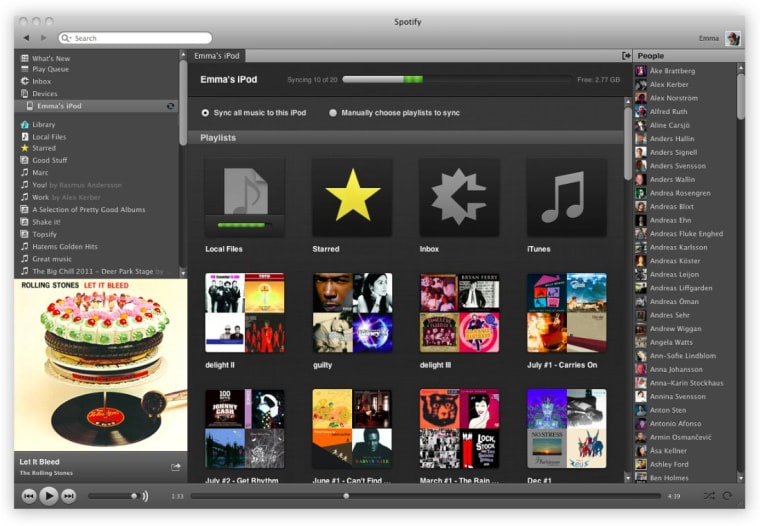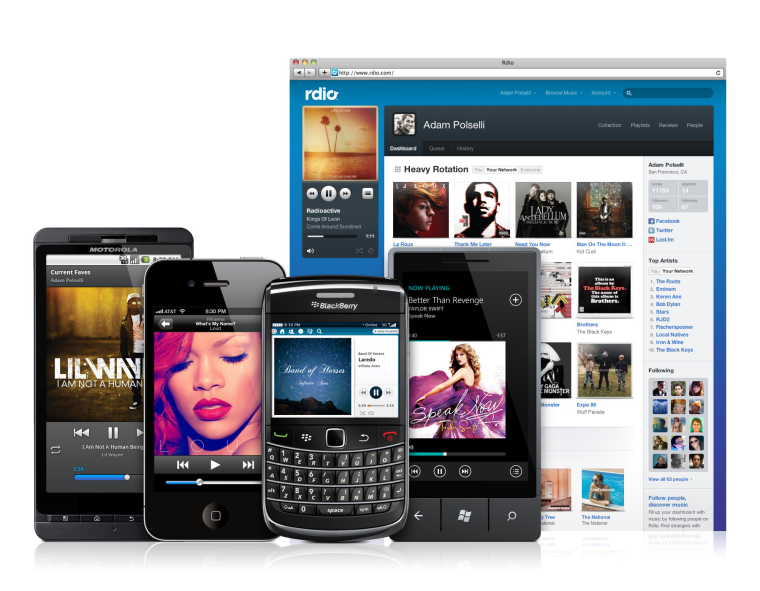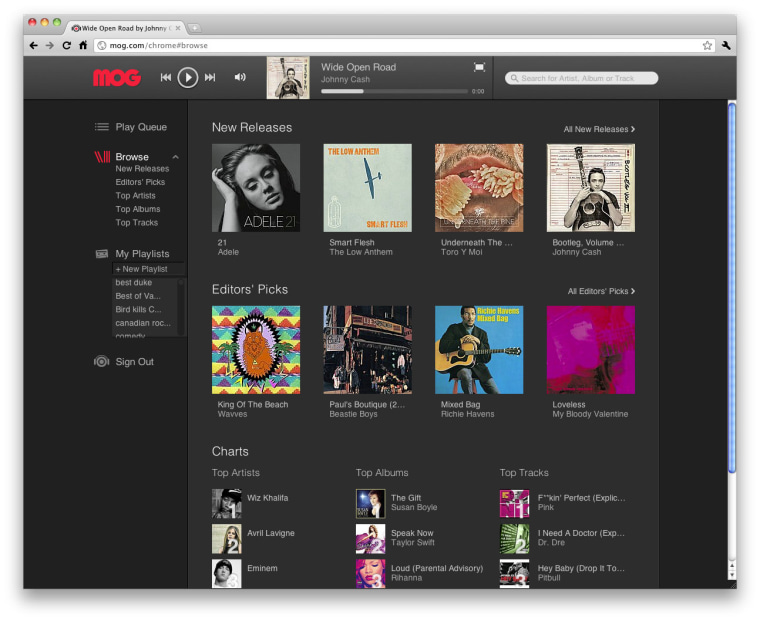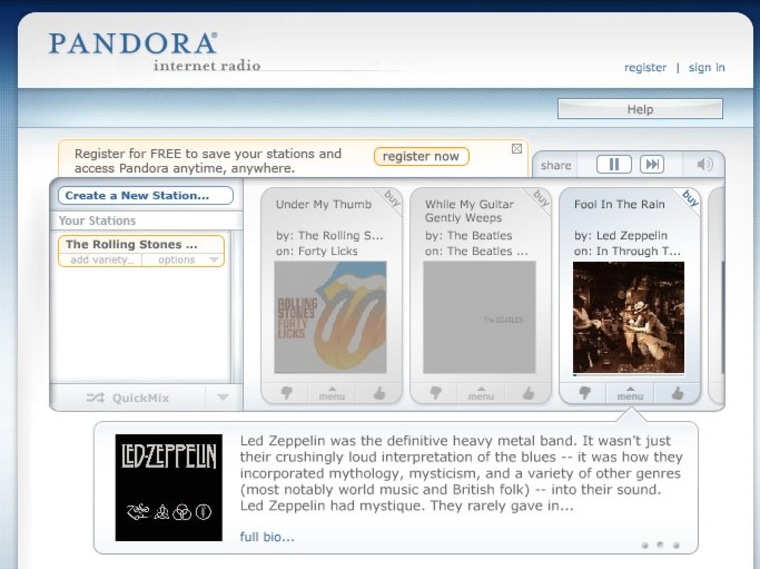You may have heard buzzing about Spotify, Pandora, Rdio and the like, enough to make your head spin. There are so many music streaming services out there that I could easily review a new one every month and never run out of sound. But as I'm not looking to torture myself — or you — by doing something like that, I'm instead taking an overall look at the best and most popular services, to explain what sets them apart, and what each one has that might be of most interest to you.

Spotify
Cost: Free (limited streaming, ad-supported); $4.99/month (unlimited streaming); $9.99/month (unlimited streaming, offline mode support, mobile support)
Spotify — which happens to be my music streaming service du jour — plays tunes from your own library as well as Spotify's collection of over 15 million tracks. You can access the music via desktop app or a variety of mobile apps. (Just note: Unlike with offerings from Amazon, Google and soon, Apple, the songs from your own library are not streamed, but instead have to be synced to the device where you're playing them.)
Some of Spotify's strengths are the sheer size of its library, the well-designed desktop app, seamless playlist syncing between devices and decent Facebook support. Now while those features are more than enough to satisfy most people, there are weaknesses to keep in mind: Spotify doesn't offer a great "discovery" feature — something Pandora and Slacker do well — and many songs available on the service appear to be cover versions by singers you've never heard of. (Despite that oddity, though, I've rarely struggled to find the popular version of a song.)

Rdio
Cost: $4.99/month (unlimited streaming); $9.99/month (unlimited streaming, mobile support)
Rdio will play music from both your own library as well as from Rdio's collection of songs in your browser, in a desktop app, or on a mobile device. Just like Spotify, it will require you to sync songs which aren't in Rdio's collection in order to play them.
One of Rdio strengths is its fantastic social networking integration. It allows you to keep up with your friends and discover new tunes by checking out what they're listening to. (The only downside to this otherwise great tool is that folks who are not big on collaborative playlists or social networking features may sometimes feel as if they're being continuously pressured to use them.)
That aside, Rdio feels quite a bit like Spotify in its features (though its library is only about half the size of Spotify's). I'd definitely recommend it if social networking integration is important to you — because Rdio's is solid.

MOG
Cost: Free (limited streaming, ad-supported); $4.99/month (unlimited streaming); $9.99/month (unlimited streaming, mobile support, unlimited downloads)
MOG's got over 11 million songs in its collection, a great browser-based interface (as well as some solid mobile apps), and social networking integration. But one of its key strengths is its "intelligent" radio feature. Essentially, you can start off with a particular track and create stations which can be customized using a magical switch. Want more of the artist? Want less of that artist? Want to hear tunes from similar performers? No problem! (Yes, this is rather similar to what you can do with Pandora or Slacker — but with far more control.)
If you're the sort of person who has a handful of favorite songs or artists but struggles to find new tunes, MOG is the way to go.
Oh, and if you're struggling for cash yet still craving for tunes, then you might want to give MOG's FreePlay option a try. It's basically a way to earn music by referring friends to the service or exploring the MOG site.

Slacker
Cost: $3.99/month (unlimited streaming, unlimited song skips, mobile support); $9.99/month (unlimited streaming, mobile support, unlimited song skips, on-demand song selection)
Slacker has elements from nearly every streaming service wrapped up in a rather lovely package. It has the intelligent radio stations offered by MOG as well as the custom playlists available on other services. Oh, and its mobile apps do offline caching — so that you're not without tunes, even when you're without the Internet.
So, what's the catch? Money, money, money.
One of the key features necessary to make Slacker well-rounded — the on-demand song selection — is only available with the most expensive $9.99/month subscription plan. And without that feature, it's too much like Pandora — except with unlimited song skips and offline caching.
Rhapsody
Cost: $9.99/month (unlimited streaming, mobile support for one device); $14.99/month (unlimited streaming, mobile support for up to three devices)
Rhapsody offers about 11 million songs, the usual assortment of mobile and desktop apps, and a music discovery feature (via hundreds of "radio" stations).
It's pretty solid, but folks who don't care about using the service on a mobile device might be annoyed that there isn't a cheaper desktop-only subscription option as with other services. If you're one of those people, then I suggest choosing one of the other (lower-priced) options.

Pandora
Cost: Free (ad-supported, limited, fewer "skips'); $36/year (no external ads, unlimited, more "skips")
Pandora has a very special place in my own heart. It's got one of the best music discovery features — one powered by the Music Genome Project — and somehow it never fails to produce a bunch of songs which perfectly fit with the mood a track you've selected sets.
No, Pandora doesn't allow you to create custom playlists. No, it doesn't offer on-demand track selection. No, it doesn't let you skip very many songs if you don't like what you hear. No, it doesn't offer amazing social networking integration.
But it does have a lightweight and clean Web-interface in addition to well-designed mobile apps. And some of the best music discovery functions out there.
If you want to discover new songs or artists — but don't necessarily need all the control offered by MOG — then Pandora is the service for you.
Google Music, Apple iTunes in the Cloud, Amazon Cloud Player
"But Rosa," someone is ready to say, "why aren't you talking about Google, Apple iCloud or Amazon, you silly woman?"
It's not because I have something against any of those services or because someone bribed me to avoid them — it's simply that they are different animals from the music streaming services covered above. Unlike Spotify, Rdio, MOG, Slacker, Rhapsody and Pandora, those services do not offer you access to a huge library of music — instead they give you ways to manage and stream what you already own.
And while that's great and exactly what some folks might want and need — especially considering how solid the services' infrastructures and apps are — I choose to focus strictly on services which allowed you access to the things you don't own. Why? Because in my silly frizzy head I keep believing that those are the sort of services which will appeal to the biggest crowd. After all, unless you're obsessed with a certain song quality or obscure tunes, why would you go through the hassle of purchasing — or somehow otherwise acquiring — every darn song you want to hear when you could stream them all, instantly, with one of these other services instead?
Related stories:
- Soon: Listen to music via Facebook
- Sony's cloud-based, digital music service now on Android
- What makes Spotify such a great music service?
Rosa Golijan writes about tech here and there. She's obsessed with Twitter and loves to be liked on Facebook. Oh, and she can be found on Google+, too.